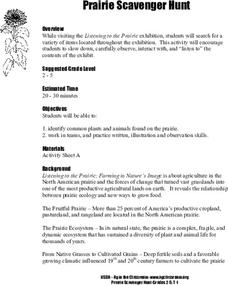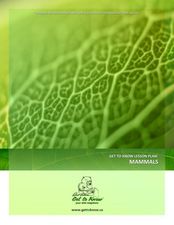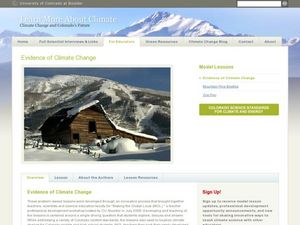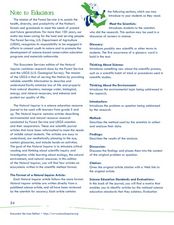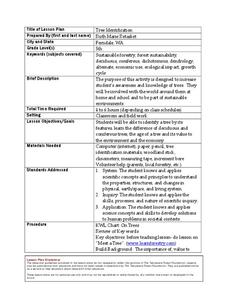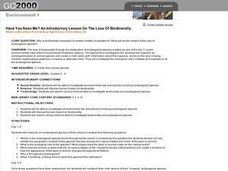Curated OER
Prairie Scavenger Hunt
Here is a simple lesson for young learners on the plants, animals, and flowers found in the prairie environment. There are worksheets embedded in the plan that pupils use once a teacher-led discussion and demonstration has taken place....
Curated OER
Prairie Scavenger Hunt
Learners search for a variety of items while visiting a Listening to the Prarie exhibition.
Curated OER
Wild Dog Debate
Young scholars participate in a mock conference addressing the possible extinction of African wild dogs. In this wild dogs lesson plan, students state their arguments and ask questions about the issues they have researched.
Curated OER
Organic Farming / Agriculture
Want an organic farming resource packed with experiments, background information, science fair projects, and topics of interest for further research? Here it is. Young environmental scientists can explore concepts involved in organic...
Curated OER
The Gaia Hypothesis: An Approach to Problem Solving in the Environment
Students are introduced to the Gaia hypothesis by examining a conceptual sketch. In groups, they analyze the way they can use Dewey's method for problem solving to solve problems within the environment. They are given a problem facing...
Curated OER
Get to Know: Mammals
Learners discover the mammals in their community. For this animal lesson, students survey their school grounds for signs of mammals. Learners examine tracks, droppings, and other signs of wildlife to learn more about the animals and...
Curated OER
Evidence of Climate Change
Sixth graders examine climate change in the state of Colorado. In this climate lesson, 6th graders watch 2 video clips regarding the topic and research the subtopics- snow pack, precipitation, temperature, forest fires, river flow,...
Curated OER
Zoo Poo
Students use Internet research to determine the amount of carbon dioxide produced per unit energy for biomass and coal. For this alternative energy lesson, students research to find out how much energy and carbon dioxide several coal and...
Curated OER
Natural Inquirer Ecosystem Article Lesson
Learners discover new ways to preserve the ecosystem by completing graphic organizers. In this environmental lesson, students read an article from the Natural Inquirer in small groups and fill out a graphic organizer based on the...
Curated OER
America's Energy Future
Students write a proposal to save energy resources. In this energy lesson plan, students research nuclear energy, coal power, petroleum, natural gas, hydroelectric power, and renewable energy. Students then debate energy issues and share...
Curated OER
Canada's Arctic Barometer
Students research arctic climates. In this Web-quest investigation, students will identify Arctic climate changes, explain the effects of these changes, relate the changes to other regions, and write their findings in a letter format.
Curated OER
Fisheries in the Open Ocean
Students explore fisheries in the open ocean. In this ocean environment instructional activity, students study the impact fisheries have on the ocean habitat. Students complete a WebQuest and summary project regarding fisheries.
Curated OER
SPLASH – Monitoring Humpback Whales
Middle schoolers view a video about the humpback whale and why it is endangered. In this endangered species lesson, students recognize the importance of observing and following an endangered species in an ecosystem. Middle schoolers...
Curated OER
Forestry Background
In this environment activity, high schoolers read the background information of forestry and focus upon harvesting and forest management.
Curated OER
Tree Identification
Students list four ways to identify trees. In this tree identification instructional activity, students use tree identification techniques such as leafs, bark, wood grain, soil type, and climate to create tables and graphs.
Curated OER
Waste Management
Students explore the impact on waste on the environment, and the impact of the 3R's (reduce, reuse and recycle) as a means of diminishing the waste created by humans.
Curated OER
How Big is Your Footprint?
Students create awareness for ways in which the "Western" lifestyle negatively impacts the Earth. They create awareness for alternatives to our current ways of living, eating and traveling. Students are challenged to talk with their...
Curated OER
Have You Seen Me? An Introductory Lesson on the Loss of Biodiversity
Students investigate environmental law and policies involving endangered species as well as discuss human impact on biodiversity through an Internet research project. Students create a milk carton of their "missing" endangered species.
Curated OER
Drought, nomads and the price of peanuts
Students read two short text items, which describe different approaches to agriculture. They describe the likely advantages and disadvantages of each approach for farmers, commercial peanut buyers, the government, nomadic herdsman and...
Curated OER
Renewable Resources: Ancient Civilizations
Students examine how ancient people used natural resources. In this renewable resource instructional activity, students will be put into 5 groups each focusing on a different past civilization. Each group will identify they types of...
Curated OER
Forest Forensics
Students explore forests. In this "forest forensic" lesson students divide into groups and go through the stations using their clues to solve the questions.
Curated OER
Groundwater as Part of the Water Cycle
Ninth graders study the effects of soil and rocks on filtering groundwater. In this groundwater lesson students complete a lab activity that includes sources of contamination.
Curated OER
What Makes you Hot?
Students manipulate different variables in a model and make inferences about the temperature on Earth. In this heat lesson students calculate the blackbody radiation of an object at a certain temperature.
Curated OER
Mushrooms Can Save the World
Students use mushrooms to solve problems. In this environmental lesson, students study how fungi have been used to combat environmental problems. Students design strategies that employ mushrooms to combat other environmental challenges.



